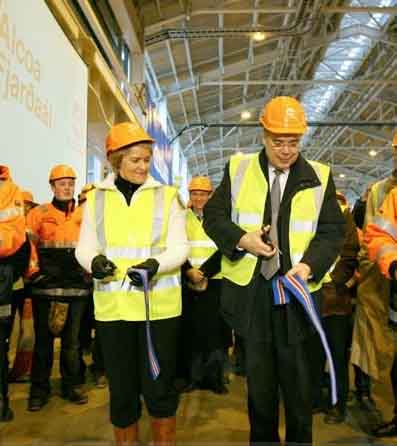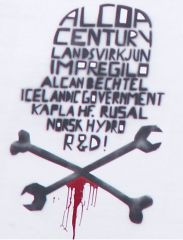
Aluminium production in Reydarfjördur begins using energy from the national domestic grid!
As Saving Iceland and others pointed out a long time ago Landsvirkjun have proven not to be able to deliver energy to ALCOA on 1 April 2007, as specified in their contract with the multinational.
This is highly embarrassing for the Icelandic government and Landsvirkjun, especially as the general elections are coming and the contract they signed with ALCOA specifies that if the energy will not be available on time the Icelandic taxpayer will have to pay penalties to ALCOA.
Apparently the government have begged ALCOA not to mention any penalty payments before the general elections on 12 May. Some weeks ago we had the questionable pleasure to listen to denials in the press that these penalties were ever written into the contract! Yet again, this shows the level of lying that ALCOA and the Icelandic government are ready to stoop to.
Obviously, it is in the interest of ALCOA that the corrupt government which gave them the wilderness of Kárahnjúkar for free, will stay in power.
Aluminium was tapped from the first pot in the new aluminum smelter last weekend. The production process began mid-April.
However, there was a low key ceremony 1 April where the Icelandic PM and other dignitaries cut the red ribbon in the factory (above). But clearly the aluminium lobby felt that making too much of the occasion might backfire PR wise in view of the embarrassing fact that the energy was not coming from Kárahnjúkar, not to speak of the defeat ALCAN experienced in the Hafnarfjordur referendum the night before!
According to mbl.is, 40 pots are expected to be put into operation during this first stage and the smelter will be running 336 pots, its full capacity amount, by the end of the year when the construction of the smelter has been completed.
The smelter in Reydarfjördur has the potential to produce 356,000 tons of aluminum per year. The smelter currently uses 100 megawatts of electricity from the national electricity system, but will need 590 megawatts from the dams in Kárahnjúkar once electricity production begins there… later this year… That is; when Landsvirkjun and Impregilo have scrambled through the last tunnels at what ever the economical and human cost.
Until then, the smelter will not be fully operational and the Icelandic taxpayer will have to foot the bill when ALCOA needs more energy to stay on production schedule (after the elections one can presume!)
For the time being ALCOA hold their breath…
But what about when it comes to the final billing from the “most litigious company in history”, Impregilo?
How much is it going to cost the Icelandic taxpayer when Impregilo have worked out all the delays caused by the deliberately highly inaccurate calculations from Landsvirkjun?
To quote our own SOS: “The Kárahnjúkar project stands as a typical blueprint for international multi-billion-dollar megaprojects where promoters self-servingly misinform parliaments, the public and the media in order to get projects approved and built. The formula for approval is a cocktail of underestimated costs, overestimated revenues, undervalued environmental impacts and overvalued economic development effects.”
If we were not talking about Western Europe’s banana republic, then Icelandic politicians and technocrats who are responsible for this disastrous mess, would be made to answer for their actions in court… But of course, as every one in Iceland knows, they have already rigged the courts with their own family members and party lackeys! Read More

